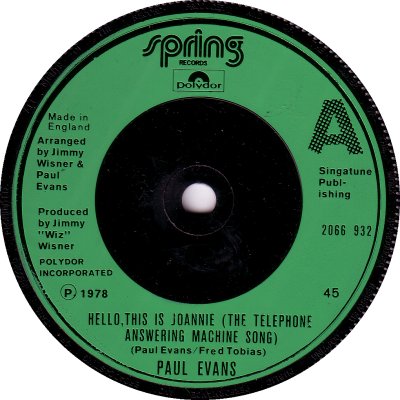
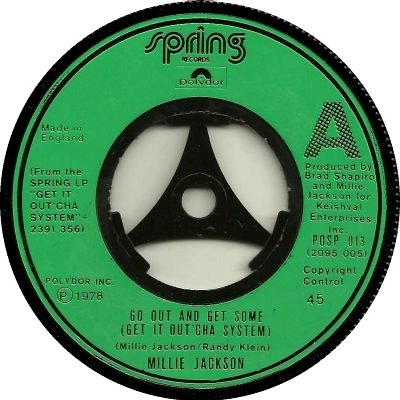
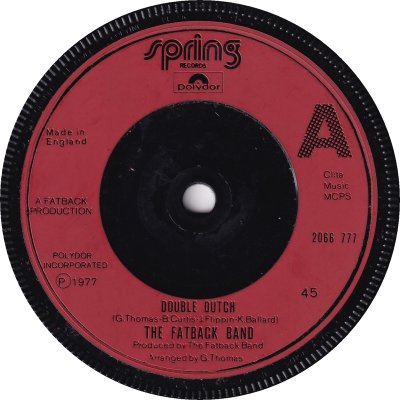
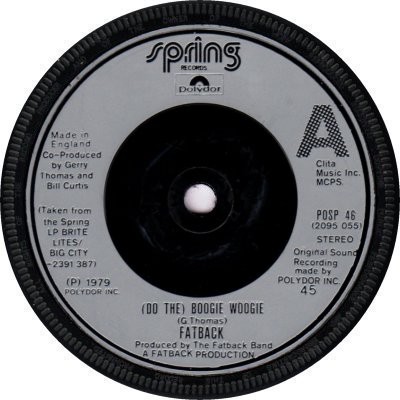
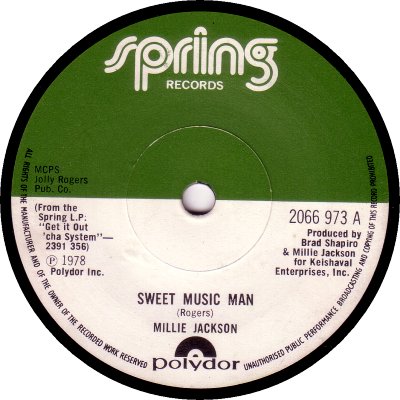

American, out of New York. The roots of Spring lie in Jules 'Julie' Rifkind's 'Guardian Productions'. Previously president of Boom Records and then general manager of Bang, Rifkind formed Guardian in the summer of 1967, along with publishing firm Gaucho Music. 'Billboard' of the 22nd of July said that deals with writers and producers had been worked out, and that Guardian would be producing Dean Parrish for Laurie Records and The Three Jades for Tower. A mere five months later 'BB' of the 2nd of December was able to report that Rifkind and MGM - by whom he had been employed previously - were working together to introduce a new label, Spring, for Pop and R&B. The first single appeared in January the following year, but it was followed by only four more, the last coming out in August of that year.
After that first attempt came to an end Guardian gathered its forces. 'BB' of the 12th of October 1968 reported that Roy Rifkind had linked his management company with his brother's label and publishing company to form a 'total music complex', which would keep the 'Guardian Productions' name. Veteran promotions man Bill Spitalny was on board, artists including Little Eva Harris and Luv Co. had been signed, and a promotional push was being given to the Luv Co.'s 'Maybe' single which had been 'shaping up nationally' according to 'BB' of the previous week. Spring was soon joined by a sister-label, Event. Commenting on the development 'BB' of the 7th of December 1968 said that it had been prompted by the acquisition of a master by Central Park West, 'Sweets For My Sweet', from producers Cashman, Pistilli and West, and was part of a production deal with that trio. The arrival of Event seems to have led to Spring taking a back seat temporarily: there were no Spring singles in 1969 against five on Event.
1970 found Spring getting its third wind. Its singles were given a new numerical series, the SPR-100s replacing the SK-700s, and Polydor took on the task of distribution. A retrospective in 'BB' of the 25th of March 1978 claimed that Polydor president Jerry Schoenbaum, an old friend of Julie Rifkind, had offered a similar deal to that which had previously been had with MGM. Towards the end of 1970 the deal was extended, with Polydor getting worldwide distribution rights to both Spring and Event. The numerical series for Event singles was changed from E-3300 to EV-200, and Event singles gained a credit to Polydor on their labels. 'BB' of the 14th of November, commenting on the agreement, said that Spring was for R&B with Event being dedicated to Pop, and that both used independent producers. It added that singer Joe Simon, who was managed by Roy Rifkind, had been signed to Spring, which should increase Polydor's strength in the Soul field.
The signing of Simon soon brought dividends: 'BB' of the 29th of January 1972 was able to congratulate Spring on the fact that his 'Drowning In The Sea Of Love' single had sold a million copies. Millie Jackson was another Spring success, and 'BB' of the 9th of September described the pair of them as 'consistent hit-makers'. 'BB' of the 7th of April 1973 reported that the strong crossover of Spring's R&B product had created a 'hot' year for the label, and that album sales had nearly doubled. There were only three artists on the company's roster - Simon, Jackson and a group called Act I - which meant that each of them could be given quality merchandising and promotion. 1974 saw a push on the album front, resulting in sales five times higher than those of any previous year, with Millie Jackson's 'Caught Up' being a major contributor ('BB', 18th January 1975). According to the article, Spring and Event had previously been known for their singles rather than their LPs.
A notable development came in 1976 with the release of Spring's first 12" single, 'Disco Crazy' b/w 'The Joint' by The Fatback Band. That band proved popular in Britain: 'BB' of the 12th of March 1977 observed that their last three albums had all sold in excess of 100,000 copies. Spring was successful generally, abroad; the same article quoted Bill Spitalny as saying that overseas markets accounted for half of the company's sales - he added that Spring believed in 'Just quietly selling a lot of records'. 1978 found Spring broadening its approach. 'BB' of the 19th of August reported that attempts were being made to 'round out' and 'balance' the roster; the company had recently signed its first white act, a band called Gypsy, from Pennsylvania, and had put out a Country record by Paul Evans, its first in that field. R&B remained Spring's main concern, however, and it was to have something of a to-and-fro relationship with Disco music. Joe Simon broke out of Blues / Country and into Disco in 1977 and registered three gold singles ('BB', 19th August 1978), and The Fatback Band embraced the genre, but while Millie Jackson told 'BB' of the 27th of January 1979 that she felt that avoiding Disco had been to her advantage as her singles tended to have a longer Chart life than Disco ones, Bill Spitalny confided in the same issue that the Disco craze was affecting sales of other forms of Black music - he claimed that sales of R&B had dropped by 50%. Six months later Roy Rifkind added his voice to that of Spitalny, saying that Black radio was being 'blown away' - if a record wasn't Disco it was hard to get it played. He added that Millie Jackson singles had usually sold around 150,000 copies in the past but that now they tended to stall at half that unless they were aimed at the Disco market.
Spring ensured a place in the history books for itself in 1979 when it released what is claimed to be the first ever Hip-Hop style Rap record, the Fatback Band's 'King Tim III'. It started out as a 'B' side to a song called 'You're My Candy Sweet', but the reaction of retailers persuaded the company to flip the disc and plug 'Tim' ('BB', 29th September). The result was impressive: less than a year later 'BB' of the 18th of July 1980 was able to reveal that 500,000 copies had been sold, 'a landmark for the genre'. Presciently, Bill Spitalny commented "Rap could be a monster if White stations played it." Spring went on form a new label, Posse, dedicated to Hip-Hop and Rap records, which it released alongside the more 'old style' Black music. Spring parted company with Polydor in 1983 and continued as an independent for several years, but doesn't seem to have put out any more records after the end of the '80s.
In Britain a handful of Spring / Event records were licensed out to Larry Page's 'Page One' and 'Penny Farthing' labels during 1969 / 70. The agreement with Polydor in 1970 led to the company's product coming out here on Polydor or on Polydor's dedicated Soul label, Mojo. After Mojo was discontinued, Spring's Soul / R&B records joined the Pop ones on Polydor. Then in 1976 'Music Week broke the news that the actual Spring label was to make its debut, with The Fatback Band's 'Night Fever' b/w 'No More Room For Dancing' (2066-706; 8/76). Sadly, Spring failed to make the same impact here that it did in its homeland. Despite selling hugely in the States, Joe Simon and Millie Jackson only managed a sole UK Chart entry each, Simon getting to the No.14 spot with 'Step By Step' b/w 'Talk Don't Bother Me' on the Mojo label (2093-030; 5/73), and Jackson spending one week at No.50 with 'My Man A Sweet Man' b/w 'I Gotta Get Away', again on Mojo (2093-022; 10/72). The Fatback Band reached No.18 with 'Do The Bus Stop' b/w 'Gotta Learn How To Dance' (2066-637; 11/75), and bettered that by hitting No.10 with 'Spanish Hustle' b/w 'Groovy Kind Of Day' (2066-656; 2/76), both on Polydor, among four lesser hits, but Spring's biggest Chart success was the atypical 'Hello This Is Joannie' b/w 'Lullabye Tissue Paper Company' by Paul Evans (2066-932; 10/78) which came out on the actual Spring label and peaked at No.6. The Fatback Band switched to the Polydor label in 1981, and the final UK Spring single came out in November 1982.
Spring singles were given numbers from two of Polydor's main series, 2066-000 and later POSP-0, and one label design served them throughout. They were usually manufactured by Phonodisc, which meant that they had injection moulded labels. The majority were coloured green (1) but the odd one or two were red (3) or silver (4); large spindle holes (2) were rare. Custom pressings by Lyntone led to some copies of one of the singles having paper labels of the same design as American ones (5), which served to highlight the comparative dullness of the injection moulded type. Unfortunately there was no company sleeve, which there was in the States; Spring singles tended to come in red Polydor sleeves, which didn't go particularly well with their green labels (6). The discography below only covers the 1970s.
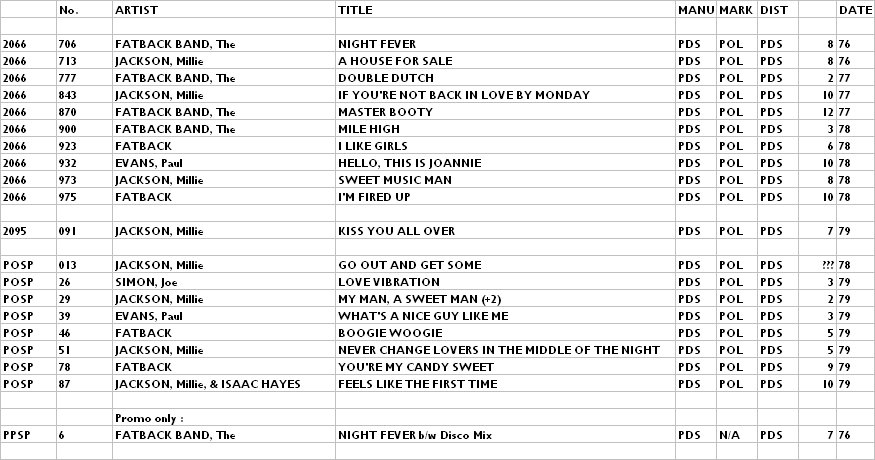


Copyright 2006 Robert Lyons.

